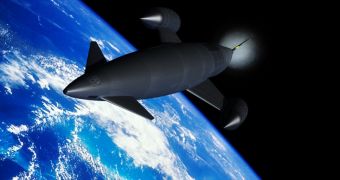This June will bring with it the last shuttle launch ever, as Atlantis is lifting off for the International Space Station, but it will also mark the beginning of a round of tests that will put the massive Skylon space plane through its paces.
Skylon is a result of a British collaboration of researchers and scientists working together with manufacturer Reaction Engines Limited (REL), of Abingdon, Oxfordshire.
It is basically one enormous aircraft, that is entirely unmanned, and which can take cargo to low-Earth orbit. It could begin doing so as early as 2020, if the new test session is passed successfully.
Its constructors are saying that the aircraft represents such a huge leap forward from existing technologies because it can take-off and land horizontally, similar to how a passenger airplane does it.
This is also how the American space shuttles land. But the orbiters need an external fuel tank and two solid rocket boosters to get off the ground, whereas Skylon will be able to take-off from a standard runway, all on its own.
In order for this to happen, the spacecraft needs to have tremendously strong motors, and this is precisely what the June tests are aimed to monitor, Space reports. The new studies will come after the Skylon project passed rigorous independent design reviews on multiple occasions.
Oddly enough for a private space company, REL has all the funding it needs lined up for it to use. If the company plays its card rights, it will have everything it needs to launch the first Skylon by 2020.
However, getting the money it won is contingent on a few things, such as for example reaching certain development milestones at specified times. The motor test is scheduled for completion in June 2011, and this leaves the company with only a few months to get everything in order.
Skylon is powered by a revolutionary hybrid jet/rocket engine, and passing the new tests will validate this concept for further use. It would also win REL about $350 million, and will ensure the successful continuation of the entire project.
“It depends on this engine test working. Everything depends on that,” explained Roger Longstaff, a research scientist at REL. He made the announcement at the 17th International Space Planes and Hypersonic Systems and Technologies conference.
All the British company needs to do in order to ensure its path to success it build a precooler system for its advanced motors. This is the only piece of new technology that will go on the space plane, REL officials said. Most other technologies are already proven and matured.

 14 DAY TRIAL //
14 DAY TRIAL //